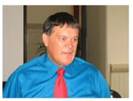Essential Keys to Training Mastery by Colin Cox
Wednesday February 2, 2011


Colin Cox kicked off the NZATD Auckland calendar with his usual flair and energy wrapped around a powerful presentation. This breakfast event was held at Jubilee Hall in Parnell and was well attended by NZATD members and guests.
Colin is a Director of Ignition Training Systems and Director of the Institute of Neuro Semantics of New Zealand and a Board Member of the Neuro Semantics Guardian group.
Colin is presently the only Master Trainer in the field of Neuro Semantics in the world and has complemented this expertise with strategies from Learning Psychology and the field of Accelerated Learning.
His topic which focused on the concept of Mastery was thought provoking and inspirational. He caught our attention by telling us as Trainers, Presenters and Speakers, mastery was not about popularity and glory; course attendance and volume; Money; International Travel or Conference Appearances.
He said mastery begins with passion, even if you are talented passion enhances your talent. He used the analogy of talented individuals like Tiger Woods who with passion and talent have become masters in their field. This mastery was created through time and effort, hard work and it was not always fun.
Every master practices over and over again. He quoted the work of Anders Ericsson which says;” research shows that even the most gifted performers and athletes need a minimum of ten years (or 10,000 hours) of intense training before they win international competitions.” They practice their weaknesses and not their strengths. They put in huge amounts of time and sacrifice to be masters. The question is...”as Learning Practitioners do we do this?”
Practice also involves feedback and the support of others. The development of expertise requires coaches who are capable of giving constructive, even painful, feedback. Real experts are extremely motivated students who seek out such feedback. They’re also skilled at understanding when and if a coach’s advice doesn’t work for them. The elite performers that were studied knew what they were doing right and concentrated on what they were doing wrong.
Colin went on to explain George Leonard’s mastery Model which evaluates the components of mastery ...focus, commitment, vision, patience, purposefulness and persistence. The Dabbler, The Hacker, The Compulsive and The Master are how Leonard differentiates individuals. The details of these personal traits are explained in Leonard’s book “Mastery – The Keys to Success and Fulfilment”.
"Only one who devotes himself to a cause with his whole strength and soul can be a true master. For this reason mastery demands all of a person." -Albert Einstein. Colin left us with a powerful message and a great deal of soul searching. It is always a pleasure to have Colin Cox at an NZATD event and we look forward to hearing of his successes in 2011.
Article by Robyn Viljoen - Branch Vice President of Auckland NZATD